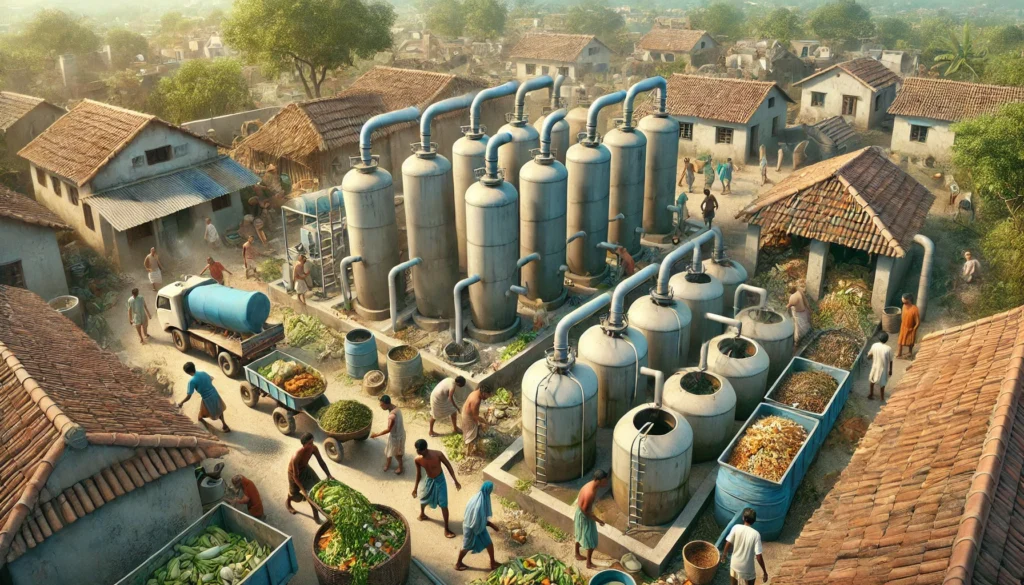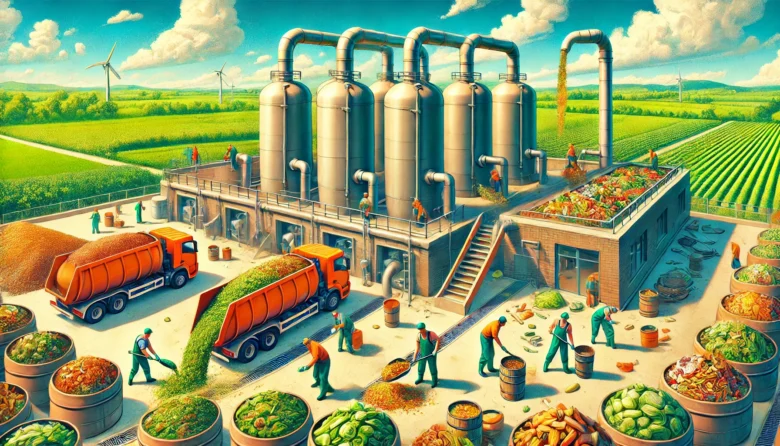Imagine turning everyday waste into a valuable resource that can power your home or fuel your stove. This is the magic of biogas plants. In India, where waste management and energy shortages are pressing issues, biogas plants offer a promising solution. In this blog, we’ll explore the potential of biogas plants, their benefits, and how they can significantly impact India.
What is Biogas?
Biogas is a type of biofuel that is naturally produced from the decomposition of organic waste. When organic matter, such as food scraps, animal manure, and agricultural waste, breaks down in an anaerobic environment (without oxygen), it releases a mixture of gases, primarily methane (CH4) and carbon dioxide (CO2). This gas can be captured and used as a source of renewable energy.
Understanding Biogas Plants
Biogas plants are facilities that convert organic waste into biogas through anaerobic digestion. The process involves several stages:
Collection of Waste: Organic waste is collected from households, farms, and industries.
Anaerobic Digestion: The waste is fed into a digester, decomposing anaerobically.
Biogas Production: The resulting biogas is captured and can be used for heating, electricity generation, or as a vehicle fuel.
Digestate Production: The leftover material, known as digestate, can be used as a nutrient-rich fertilizer.

The Potential of Biogas Plants in India
India generates a substantial amount of organic waste daily. From food waste to agricultural residues and livestock manure, the potential feedstock for biogas plants is enormous. Biogas plants can contribute significantly to India’s energy mix and waste management strategies by harnessing this waste.
Benefits of Biogas Plants:
Renewable Energy Source: Biogas is a sustainable and renewable energy source, reducing dependence on fossil fuels.
Waste Management: Biogas plants help manage and reduce organic waste, addressing waste disposal challenges.
Energy Security: By producing energy locally, biogas plants enhance energy security and reduce import dependence.
Environmental Benefits: Biogas production reduces greenhouse gas emissions by capturing methane that would otherwise escape into the atmosphere.
Economic Opportunities: Biogas plants create jobs and stimulate the local economy through the production and maintenance of biogas systems.
Successful Biogas Initiatives in India
Several successful biogas initiatives in India demonstrate the potential of this technology. For instance, the Sulabh International Social Service Organisation (an NGO promoting human rights, environmental sanitation, and non-conventional energy sources) has implemented biogas plants in public toilets, converting human waste into biogas. Similarly, the Khadi and Village Industries Commission (KVIC) has been promoting biogas plants in rural areas to provide clean energy for cooking and lighting.
Challenges and Solutions
While the potential of biogas plants is immense, several challenges need to be addressed to maximize their impact:
Initial Costs: Biogas plant setup costs can be high. However, government subsidies and financial incentives can help mitigate this barrier.
Awareness and Training: Many people need to be aware of biogas’s benefits. Educational programs and training workshops can help spread awareness.
Maintenance and Management: Proper maintenance is crucial for the efficient functioning of biogas plants. Developing local expertise through training can ensure effective management.
Implementing Biogas Plants in Indian Households
Biogas plants are not just for large-scale operations; they can also be implemented in individual households. A small-scale biogas plant can convert kitchen waste and animal manure into biogas for cooking, providing a clean and efficient energy source.
Steps to Set Up a Home Biogas Plant:
Assess Waste Availability: Determine the amount and type of organic waste available in your household.
Choose the Right Size: Select a biogas plant size that matches your waste generation and energy needs.
Install the Plant: Set up the biogas plant in a suitable location, ensuring proper installation and connections.
Start Feeding the Plant: Regularly feed the plant with organic waste and maintain it as per the guidelines.
The Future of Biogas in India
The future of biogas in India looks promising. With the right policies, awareness, and investment, biogas plants can be crucial in addressing energy and waste management challenges. The government has recognized this potential and promotes biogas through various schemes and initiatives.
Conclusion
Energy from waste is not just a futuristic concept; it’s a practical and viable solution for today’s energy and waste management challenges. Biogas plants offer a sustainable way to generate renewable energy, manage waste, and create economic opportunities. By embracing biogas technology, India can move towards a cleaner, greener, and more sustainable future.
Author’s Note
Thank you for joining me on this journey to explore the potential of biogas plants in India. If you found this blog enlightening, please share it with others interested in sustainable energy solutions. Let’s work together to make our environment cleaner and our energy more sustainable.
G.C., Ecosociosphere contributor.
References and Further Reading:
- Sulabh International Social Service Organisation
- Khadi and Village Industries Commission (KVIC)
- Green Energy | CHIRAG TECHNOPRODUCTS AND CONSULTANTS. https://ctp.org.in/green-energy/
- Biogas Digesters: Unlocking Energy Potential from Organic Waste – Flux. http://fluxfair.nyc/biogas-digesters-unlocking-energy-potential-from-organic-waste/
- The Growing Popularity of Solar Energy in San Antonio | TheAmberPost. https://theamberpost.com/post/the-growing-popularity-of-solar-energy-in-san-antonio
- A Sustainable Solution on How Kano State can Harness Biogas from Waste – Blonergy Biogas. https://blonergy.com.ng/a-sustainable-solution-on-how-kano-state-can-harness-biogas-from-waste/
- Tips for Earth Day April 22 – Rossland Telegraph. https://rosslandtelegraph.com/2017/04/19/tips-for-earth-day-april-22/
- The statistics from indoor pollution deaths must not be forgotten. https://hivos.org/blog/the-statistics-from-indoor-pollution-deaths-must-not-be-forgotten/
- Ants Running in Circles: Unraveling the Mystery | PestWeek. https://pestweek.com/ants-running-in-circles/




